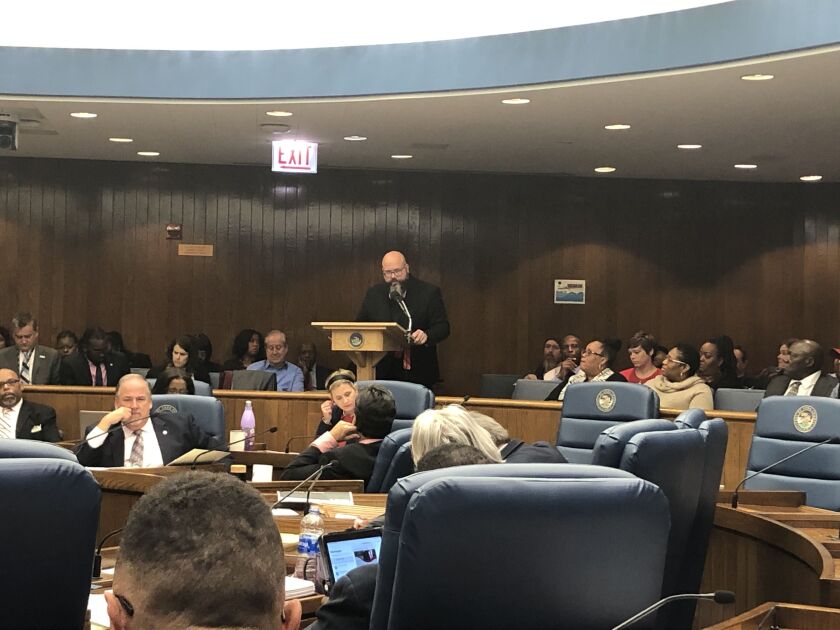Property owners and landlords objected Wednesday to the latest proposed rules to an amended county housing ordinance, calling them too strict in the limits on how much of a potential applicant’s criminal history is available to them and too lenient in the time applicants are given to dispute the background checks.
The housing and rental industry officials argue the changes jeopardize safety and cost them money by tying up property they could be selling or renting to someone else during the wait periods.
It’s the latest in a long-give-and-take between the housing providers and advocates trying to help people with criminal histories rejoin society.
But the long delays in hammering out the housing rules are doing nothing to calm tensions or tempers. Wednesday’s hearing before the County Board’s Rules Committee featured housing industry figures complaining their hands were being tied by the rules and activists arguing that past brushes with the law are being treated as a modern-day a scarlet letter.
And one commissioner accused an industry figure of racism.
The fireworks came after the county’s Commission on Human Rights modified rules county commissioners sent them. But landlords say they only made them worse.
“After providing the industry perspective, the commission revised the rules dramatically, striking compromises with members this very body facilitated in favor of a version even more objectionable to housing providers than the rules the commission proposed in July,” Tom Benedetto with the Chicagoland Apartment Association, said at a meeting of the county’s Rules Committee Wednesday.
Last week, the county’s Commission on Human Rights proposed reducing the period of time a landlord can look back into a potential tenant’s criminal history from five years to three.
Potential tenants were also given more time to dispute the use of their criminal history in the housing application process. In the new proposed rules, they have five business days from the date they receive notice their criminal history is being used to tell the housing provider that they intend to dispute the “accuracy or relevance of any criminal convictions from the last three years.” The old rules proposed just two days to do so.
Would-be tenants also have an additionall five days to produce evidence to dispute the accuracy or relevance of their criminal histories, which is the same as the old rules
Those were the main concerns for Benedetto and other industry figures who spoke Wednesday. Terry Clemans, from the National Consumer Reporting Association, said the proposed rules could make the county “one of the most dangerous multi-family housing destinations.”
“It is not going to provide safe housing, this ordinance as proposed today is unreconcilable with that goal,” Clemans said.
Commissioner John Daley, D-Chicago, called any suggestion that the changes would lead to more violence “very offensive and degrading to everyone” who has participated in the process of trying to create the ordinance.
Commissioner Brandon Johnson, D-Chicago, a key sponsor of the amendment to the Just Housing Ordinance, called Clemans’ comment offensive and racist, and said he’s “so sick and tired of my people having to beg.”
“We have an opportunity to do something right in this county, to suggest that somehow my neighbors, because they’re black, are violent is absolutely stunning and ridiculous,” Johnson said. “This body has already voted to bring justice in this county and I appreciate that because it’s important that we not only represent our values, we actually have to vote our values.”
Clemans objected to any characterization of racism in his comments.
“Nothing in my comments had anything to do with race,” he told the Sun-Times later. “[Johnson] brought that into the discussion.”
“My comments focused on making informed decisions to find the proper balance between safe housing and access to housing,” Clemans said in a statement. “That applies to anyone with a previous criminal history, regardless of race.”
Commissioners have worked on crafting the rules in the months since the amendment to the county’s housing ordinance passed in April. It’s designed to end housing discrimination against people with criminal records.
Many of those in support of the ordinance and the changes the commission made showed up to Wednesday’s meeting wearing red ‘X’s on their chests or backs, equating a criminal record with a scarlet letter. They asked commissioners to vote for the rules.
Troy O’Quin, who has a criminal background and wore a red X, told the committee he’s “at a loss for why we are still going through this.”
“This is the only protected class, if we consider criminals a protected class, that has to prove that we’re not monsters anymore, but we’re human beings,” O’Quin said.
On Tuesday, Cook County Commissioner Larry Suffredin, D-Evanston, who chairs the Rules Committee, said it’s possible the committee may have to extend the effective date of the ordinance depending on when the rules can be figured out.
The committee held off a vote on the proposed changes, until the county’s Commission on Human Rights has a chance to provide a detailed explanation for its modifications and reconsiders the earlier proposed rules.







